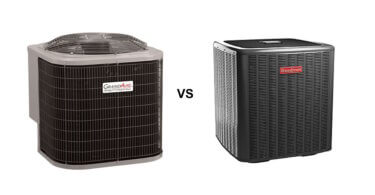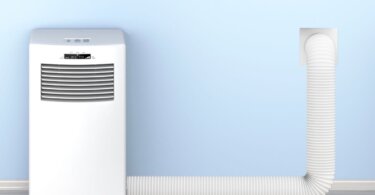Did you find a line of water outside your building wall emanating from your air conditioner? Is your air conditioner leaking water? And are you wondering whether you should just continue to let it run that way because it might cost you to get it repaired?
In most cases, your air conditioner leaks water when the evaporator coils are frozen, or the mechanism that collects and ejects the water from the evaporator coils outside the AC is broken or clogged. If you continue to use your air conditioner in this situation, then it will damage the entire air conditioning unit.
Secondly, water dripping from your air conditioner can damage your walls and ceilings. The moisture in the walls might cause mold to grow and pollute the air. Therefore, this is something that you should immediately address.
In this article, we will discuss the reasons why water leaks from your air conditioner. And answer your question ‘can we use AC when water is leaking?’

Why Does My Airconditioner Form Water?
Most air conditioners have two units: indoor and outdoor units. The indoor unit houses the evaporator coils, which are the heat exchangers of the AC.
The liquid refrigerant at low temperature and pressure inside these coils draws heat from your room and supplies cold air.
The surface temperature of these evaporator coils is below the dewpoint temperature (the temperature at which water becomes condenses to form dew).
When warm air consistently comes in contact with evaporator coils, the moisture in the air condenses and drips into the drain pan and then finally goes out through a drain line.
The condensation process in the evaporator coils is what creates water inside the AC, but why it leaks is a different matter. Let us discuss leakages in the next section.
Related article: Air Conditioners Buyer Guide
1. Improper Installation
If you have recently installed your air conditioner and find that water is leaking, it is probably due to improper installation. It means your drainage pipes are not the right size for your air conditioner. Consequently, the water cannot flow from the drainage pan to the outlet, and there is waterlogging.
The water ends up staying in the same place or flows backward, which is when your air conditioner starts leaking water. Ensure that your drainage pipe is at a lower vertical level relative to the main unit of your air conditioner so that water can flow towards the outlet.
Solution
You should call a technician immediately and request the correct installation of your unit.
Related article: What Are The Types Of Air Conditioners
2. Your Drain Pipe Is Clogged
Sometimes dirt and other debris can clog your drain pipe. As a result, the condensate cannot flow outwards and may flow back towards the main air conditioning unit. This causes water to drip from your AC.
Solution
You need to clean the clogged drainpipe, following these steps:
- Turn off your air conditioner.
- Find the drain line. The drain pipe usually consists of PVC and attaches to your house’s wall.
- Take a thin brush and push it towards the end of the drain pipe.
- You may need a wet or dry vacuum to clear the blockages of your drain pipe.
- Remove the cap of the T-shaped vent and pour one-fourth cup of distilled vinegar.
- Wait for a few minutes and then pour some water. If the water flows outside, you will understand that your drain line doesn’t have any blockages. But don’t forget to place a bucket on the other end of the drain pipe.
- Replace the cap of the ven tee.
3. Your Drain Pan Is Damaged
All air conditioning systems have a drain pan located just underneath the evaporator coils. The drain pan catches the condensate from the evaporator when it drips. Drain pans are mainly of three types:
1. Galvanized Steel Drain Pan
It is the most widely used drain pan and is also the most durable. They will cost less than stainless steel drain pans.
2. Stainless Steel Drain Pan
They are corrosion-resistant and may last for up to 25 years. But they are a bit more expensive compared to other drain pans.
3. Polymer Drain Pan
A polymer drain pan will cost less than stainless steel and usually lasts for many years.
The truth is, no matter what type of drain pan you use if you run your air conditioner for many years, any drain pan will rust, corrode, and get damaged. Once it is damaged, the drain pan cannot collect condensate, and water will start leaking from your air conditioner.
Solution
If it happens to you, we advise you not to seal the drain pan. It will fix the issue for a few years, and you will face the same problem again. Replace the drain pan with a new one.
4. Your Air Filter Is Dirty
The air flowing into your air conditioner contains dust, dirt, and other impurities. The air first passes through the air filter. The air filter in the air conditioner removes impurities so that clean air moves to the cooling coil.
But when your air filter gets dirty, less warm air is able to flow into the evaporator coils. The refrigerant inside the evaporator coils cannot vaporize and remains liquid.
This makes the evaporator tubes colder, and moisture in the air condenses to form ice over the coils. This causes excess dripping when you shut off the air conditioner. More than your drain pan can handle, thus leading to water leakage.
Solution
Clean the air filter from time to time. You need to take out your air conditioning filter and clean it with running water each month. The backup plan is to call experts from a local HVAC company to fix the issue.
5. The Refrigerant In Your Air Conditioner Has Become Low
The refrigerant in an AC is a fluid that easily converts from a liquid into a vapor state and can be condensed from the vapor phase to the liquid state. This is the main heat exchanger of an AC.
When the refrigerant becomes low in your air conditioner, it causes ice to form on the evaporator coils, just like a dirty air filter. Once the ice on the evaporator coil starts melting, water will overflow out of your drain pan, and you will have water leakage.
Refrigerant leakage is easy to detect because your air conditioner will not cool your room as efficiently as it used to. Or it will take a longer time to cool the room. It might also cause a hissing noise.
Solution
Leakage of refrigerant is dangerous. You should call an HVAC professional to fix this issue.
6. Broken Condensate Pump
The condensate pump helps in pumping excess water outside. But if it’s broken, it cannot pump the water outside and causes water to leak.
Solution
Try to repair your condensate pump as soon as possible or replace it with a new one.
Final Thoughts
Water leakage in your air conditioner can be very serious because it might cause an electrical shock or else cause damage to your wall or floor. If you find water leaking from your AC, you should get it repaired immediately.
Related articles:
Air Conditioner Starts Then Stops After a Few Seconds (Solved)





Leave a Comment